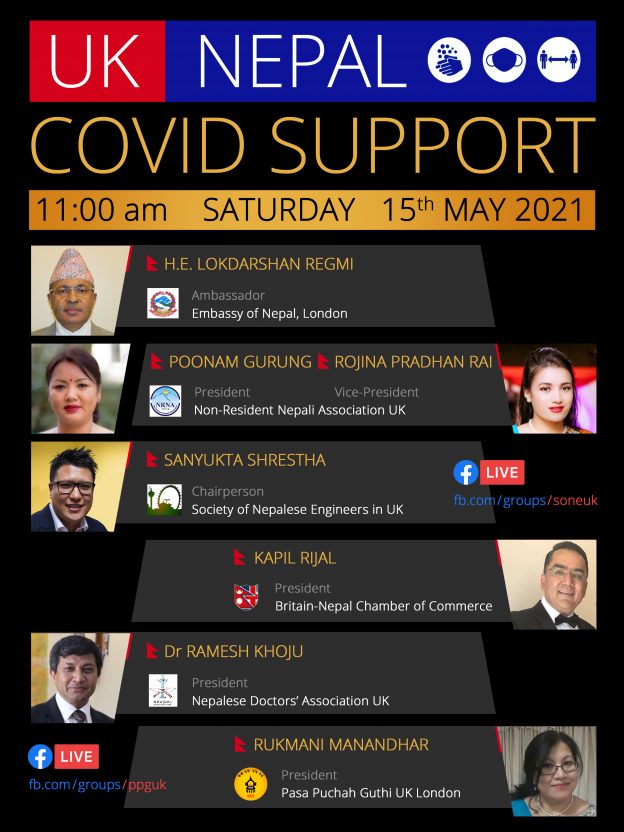10th May 2021
In the wake of the 2nd wave of COVID-19 in Nepal which brought a higher infection and death rate leaving the country’s health system helpless, an executive webinar titled ‘UK-Nepal COVID-Support’ was organised jointly by the Embassy of Nepal in the United Kingdom, Society of Nepalese Engineers in UK (SONEUK), Pasa Puchah Guthi UK (PPGUK) London, Nepalese Doctors’ Association UK (NDAUK), Britain-Nepal Chamber of Commerce (BNCC) and Non-Resident Nepali Association UK (NRNAUK).
The webinar opened with the first segment for formal addresses facilitated by Dr Bidur Ghimire, General Secretary, SONEUK.
The Ambassador of Nepal to the UK, His Excellency Lokdarshan Regmi informed that the 2nd wave of COVID-19 virus with new variants has created an unprecedented crisis in Nepal. He elaborated on the measures taken by the Government of Nepal, shortages of facilities and equipment faced by Nepal and the list of urgent medical supplies that are needed. He also explained about the ways that the embassy can help to coordinate help from the UK.
Mr Sanyukta Shrestha, Chairperson, SONEUK, expressed his organisation’s fundamental interest in technological contributions to Nepal and that it had raised more than £10,000 towards manufacture and distribution of PPE in Nepal during the first wave of COVID-19. While SONEUK wants to work together with other organizations for a bigger impact, he urged all Nepalese organisations to come together because the countries who handled the pandemic better, did it collectively rather than separately.
Ms Rukmani Manandhar, President, PPGUK London, introduced her organisation as a 21-year-old cultural organisation with a history of handling crises in Nepal and its strength being ground-level deployment of people and distribution channel for aids. She emphasised that the impact of COVID is not the same on all different communities alike hence the need to direct attention towards marginalised and backward communities for instance.
Dr Ramesh Khoju, President, NDAUK, introduced his organisation as a 35-year-old Nepalese organisation in the UK which has been fundraising for CCMC’s isolation centre in Samakhusi, to help with oxygen supply. In association with Health Exchange Nepal (UK), it has installed oxygen pipelines in Nepal worth £20,000. Supporting the Alliance of Nepali Medical Diaspora’s Fight against 2nd Wave of COVID 19, NDAUK is aiming for oxygen plant installation.
Dr Kapil Rijal, President, BNCC, reported his factual observations directly from Nepal that there is no ICU bed anywhere and the lack of oxygen is the main cause of death. Oxygen scarcity has led 130-140 bed hospitals to reduce their capacity to 60-70 only. There are eight plants and one of the big plants broke down just the day before. He urged everyone to stop raising small funds, collect it together and channelise through the embassy to establish plants and get cylinders to Nepal.
Ms Poonam Gurung, President, NRNAUK, and Ms Rojina Pradhan Rai, Vice-President, NRNAUK, informed that NRNAUK assisted a total of 229 Nepalese people were repatriated from the UK to Nepal through Nepal embassy during 1st wave of COVID-19. They have been in touch with all Nepalese councillors to lobby for vaccines for Nepal and the HE the ambassador of Nepal has appointed NRNAUK to work with all Nepalese organisations in order to help Nepal.
The second segment of the seminar was a discussion session participated by groundworkers, professionals and diplomats related to Nepal and the UK, facilitated by Mr Ojesh Singh, President, PPGUK (Board of Trustees).
In this session, Ms Sumana Shrestha from CovidAlliance4Nepal (CA4N), emphasised that one of the biggest needs is that of data so we should generate as much data as possible. She advised that Nepal needs a plane full of oxygen plants, concentrators, CPAP and PPE, and the timeline is very crucial because receiving help by August will be too late.
Prof Padam Simkhada, University of Huddersfield, illustrated how the problem is all over the country even though a lot of focus is mainly on the capital. He explained that in micro level, Nepal is much worse than India now; death rate in Nepal is 5.3 per million whereas that in India is 2.9 per million (8th-15th May 2021).
Mr Ananda Mishra from CA4N informed that installation of 10 oxygen plants is booked from France and various stakeholders are working to accomplish it.
Mr Andrew Sparkes, Former UK Ambassador to Nepal and Chairman, Britain-Nepal Society, emphasised that 150,000-200,000 Nepalis living in the UK should write to their MPs, which will eventually make a difference.
Dr Sudan Raj Panthi, Nepal National Director, World Health Organization, informed that 98% people in Nepal have no access to the vaccine and a first dose vaccinated population of 1.3 million do not know when they will get their 2nd vaccine. He advised that we should keep lobbying for the vaccine, which yet.
Dr Ramu Kharel, an Emergency Medical Profession, on behalf of CA4N, re-emphasised that oxygen is the number one priority for this week, but it may not be so in a week or two.
Col. Nick Hinton, Chairman, Britain-Nepal NGO Network (BRANNGO), advised Gurkha engineers, who helped Nepal with reconstruction after the last earthquake, can help Nepal with putting up hospitals. SONEUK member Mr Raj Ghale reiterated the same.
Video recording of the seminar: https://www.youtube.com/watch?v=NJyo1sD3Euo
Full report: http://www.soneuk.org/wp-content/uploads/2021/05/UK-Nepal-COVID-Support-Seminar-REPORT.pdf

